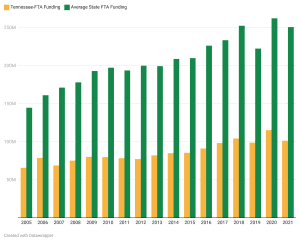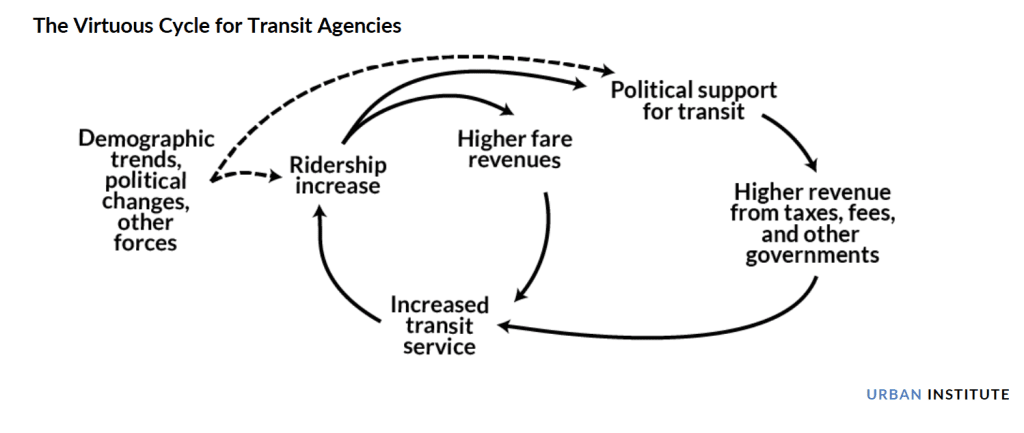Tennessee’s lack of transportation options is affecting road safety, cost, quality of life, and access to opportunities for Tennesseans. Tennessee ranks 43rd in the nation for transportation costs relative to household income for moderate-income families. Transportation costs are estimated to be 32% of the household expenses for a moderate-income Tennessee family, while 15% is considered affordable. Tennessee’s roads are also more dangerous than those of peer states. Traffic fatalities have increased 29.9% from 2011 to 2020. It is particularly unsafe for road users who are not in a vehicle – traffic fatalities for pedestrians and cyclists increased 115.9% over the same period. Improving the outcomes of our transportation system requires rethinking our transportation investments.
 In Tennessee, our transit funding is in dire need of increased investment. The average state collected $206 million from the Federal Transit Administration (FTA) between 2005-2021, while Tennessee collected only $86.1 million during the same period. The state’s contributions to transit, which typically come in the form of operating assistance and matching funds for federal grants, are 9% lower than what other states contribute to local transit. And at the local level, none of Tennessee’s major cities have adopted dedicated funding for transit. The first and only attempt to do so was Nashville’s 2018 transit referendum.
In Tennessee, our transit funding is in dire need of increased investment. The average state collected $206 million from the Federal Transit Administration (FTA) between 2005-2021, while Tennessee collected only $86.1 million during the same period. The state’s contributions to transit, which typically come in the form of operating assistance and matching funds for federal grants, are 9% lower than what other states contribute to local transit. And at the local level, none of Tennessee’s major cities have adopted dedicated funding for transit. The first and only attempt to do so was Nashville’s 2018 transit referendum.
To better understand the crucial role of dedicated local funding for public transit, ThinkTennessee has released an interactive resource and dataset analyzing the transit funding sources for the top 50 major metropolitan areas. This new map builds on tools such as the American Public Transportation Association’s (APTA) Center for Transportation Excellence that tracks public transportation ballot measures in all 50 states, but serves as an updated comprehensive resource displaying the relationship between local funding structures and the revenue generated for transit.
Our research found that 46 of the 50 largest metro areas in the U.S. have secured some form of dedicated funding for their transit agencies. The most common source is sales tax: 39 of the 46 major metro areas with dedicated funding utilize some form of sales tax ranging from 0.375% to 2%, which generates an average of almost $394 million in annual revenue for each metro area. Other common sources of revenue include various forms of property tax, such as property title transfer fees or mortgage recording fees, and vehicle registration or sale fees.
There are only four cities without dedicated funding – Orlando, Nashville, Memphis, and Hartford. Two of the four are right here in Tennessee. The lack of high-quality transit in the state’s urban areas forces Tennesseans to overly rely on automobiles, creating worse outcomes for all residents. In Middle Tennessee, this has exacerbated traffic congestion resulting from increasing population growth: a new report recently ranked Nashville as having the worst commute in the country. Nashvillians spend nearly 30 minutes each day commuting to work and lose 41 hours to traffic congestion each year. While this is shorter than many other large cities in the U.S., Tennessee’s lack of other options – our transit, walk, and bike performance scores rank 30 or below nationally – leads to the worst commute score. In Memphis, commuter’s drive alone rates are 8% higher than peer cities, and its transit riders frequently face service cuts and delays due to lack of adequate funding that undermine the network’s effectiveness and public support.
High-quality transit systems improve lives and access to opportunities, and local dedicated funding provides reliable revenues that support quality transit and matching dollars that increase the likelihood of winning state and federal grants. It enables a more stable long-range planning process and improves the ability of transit agencies to deliver capital projects successfully. Reliable transit funding that serves riders effectively through better transit networks and frequency increases ridership and public support for further transit investment, leading to a virtuous cycle that better serves transit agencies, local governments, and communities.

Metro areas with strong public investments in transit provide benefits to all residents – those who live in communities with high-quality transit service benefit from more affordable transportation costs, increased public safety and health, improved mobility options for non-drivers, regional economic development, and improved environmental quality.
Visit thinktennessee.org/localtransitfunding to explore the data.





